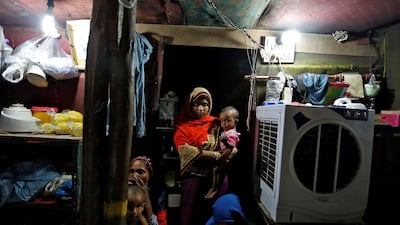The issue most likely to dominate prime minister Narendra Modi’s two-day trip to Myanmar this week is the deportation of thousands of Rohingya Muslim refugees from India.
Mr Modi will arrive in the capital, Naypyidaw, on Tuesday on his way back from the Brics summit in the Chinese city of Xiamen. He is scheduled to discuss the deportation of the ethnic minority with the government of de facto leader Aung San Suu Kyi, the Indian foreign ministry said on Friday.
India announced this month that it plans to deport about 40,000 Rohingya from the country, as renewed violence in Myanmar's Rakhine state forced thousands of members of the ethnic minority to flee to Bangladesh and other countries — including India.
“We will be discussing how India can help them in addressing the situation that is prevailing in the state," Sripriya Ranganathan, a senior official in India’s foreign ministry, told reporters. "Lot of countries are impacted … but ultimately it's for the government of Myanmar to address the situation.”
_______________
Read more:
'Beheadings of Rohingya children,' arson and widespread abuses in Myanmar
Nearly 50,000 of Myanmar's Rohingya have fled towards Bangladesh in past week
Satellite pictures show Rohingya villages in Myanmar razed
_______________
The one-million-strong Rohingya community has been persecuted and considered stateless since 1982, despite having lived in Myanmar for generations. Myanmar, a Buddhist-majority country, classifies members of the group as "Bengali" and, therefore, belonging in Bangladesh.
Roughly 400 Rohingya are said to have been killed in military action against the group in Rakhine, which lies on the eastern coast of Myanmar and just south of Bangladesh.
The army has claimed it was acting against “terrorists” among the Rohingya community.
But UN secretary general Antonio Guterres said on Friday he was concerned about “reports of excesses during the security operations conducted by Myanmar’s security forces in Rakhine State”.
He urged “restraint and calm to avoid humanitarian catastrophe”.
In just the last week, roughly 30,000 Rohingya have crossed into Muslim-majority Bangladesh where there were already an estimated 400,000 refugees, according to the government of Bangladesh. In India, there are roughly 40,000 Rohingya refugees, all of whom the country wants to deport, although the government has not yet announced a timeline.
Of the 40,000 refugees, 16,500 are registered with the United Nations and carry identity cards which the body says helps “prevent harassment, arbitrary arrests, detention and deportation”.
India, however, maintains it is not a signatory to the UN’s 1951 Refugee Convention or the 1967 Protocol Relating to the Status of Refugees and as such has no obligation to shelter the Rohingya refugees.
Kiren Rijiju, India’s minister of state for home affairs, said on August 14 that the UN’s registered identity cards were meaningless.
“As far as we are concerned, they are all illegal immigrants,” he said. “They have no basis to live here. Anybody who is an illegal migrant will be deported.”
Mr Rijiju also shot back at international agencies and human rights groups that were seeking to “demonise” India because of its decision to deport the refugees.
“India is the most humane nation in the world. Millions of refugees live in India,” he said, adding that the country would follow due process in organising the deportations.
“We are not going to shoot them nor are we planning to throw them in the ocean,” he said.
The Indian government has also sent out instructions to states, urging local authorities to identify and deport Rohingya refugees.
“These illegal immigrants not only infringe on the rights of Indian citizens but also pose grave security challenges,” the home ministry’s circular to states said.
It is not yet clear where the deported refugees will go. Both Bangladesh and Myanmar have expressed their unwillingness to take them.
Dr Nafees Ahmad, who teaches refugee law at New Delhi’s South Asian University, said India’s position is “untenable”.
“Even if India doesn’t subscribe to the 1951 treaty, there are many other human rights instruments to which India is a party and which forbid sending back refugees to a country where their lives are in danger,” Dr Ahmad said. “India’s constitution also extends the right to life and liberty to foreigners within its borders.
“So if India wants to be a part of the world’s committee of civilised nations, it cannot run away from its responsibility of protecting the Rohingya.”
On Monday, India’s Supreme Court will hear a plea by two Rohingya refugees, Mohammad Salimullah and Mohammad Shaqir, who petitioned that their lives would be in danger if they are sent back to Myanmar.
An argument will be made that their deportation violates international human rights norms and Article 21 of the Indian constitution. Previous legal judgments have held that Article 21, which protects life and personal liberty, also applies to foreigners in India.
India, however, has chosen to side with the Myanmar government as part of its plan to woo the strategically-located country, which is also being courted by China.
On Wednesday, soon after the latest spate of violence in Rakhine, Raveesh Kumar, spokesman for India’s external affairs ministry, said New Delhi extends “strong support at this challenging moment” to the government of Myanmar.
“India is seriously concerned by reports of renewed violence and attacks by terrorists in … Rakhine,” Mr Kumar said. “We are deeply saddened at the loss of lives among members of the Myanmar security forces.” He did not mention the Rohingya.
Mr Modi will no doubt press this line during his visit to Myanmar on September 5. He is scheduled to visit both Naypitaw and Yangon, the former capital of Myanmar. He will also travel to Bagan to announce Indian funding for the conservation of 11th-century temples in the ancient town.
As India’s gateway to South-East Asia, Myanmar forms a crucial component of Mr Modi’s “Act East” policy, intended to develop commercial and strategic ties with the region.
But China is still the largest foreign investor in Myanmar, having total investments in the country of US$18.5 billion (Dh68bn), far in excess of India’s $2bn.

